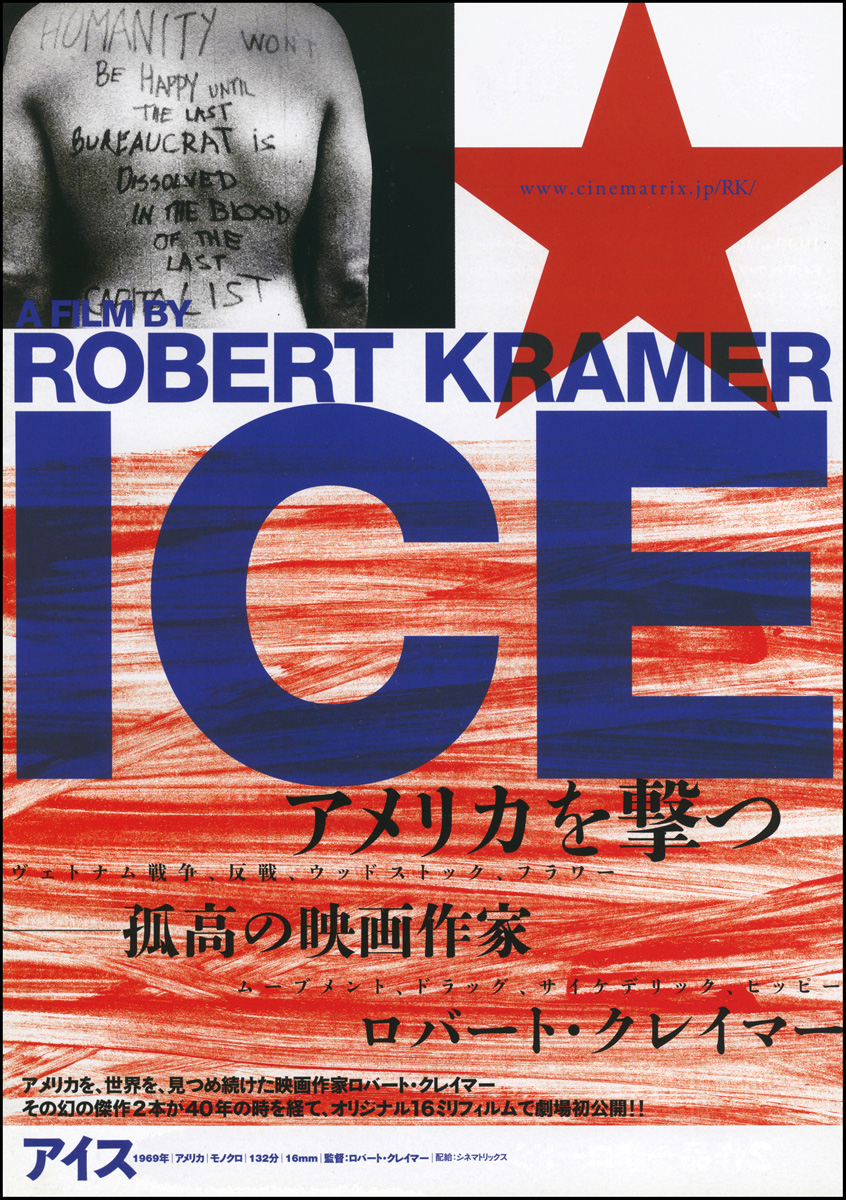|
ICE (1970).
 Financed by the American Film Institute, ICE is a powerfully subversive 16mm gem, that spins a fictional tale of rebellious citizens, an oppressive government and terrorism. The leads are a ragtag group of freedom fighters who realize that the increasingly-fascist State is actually our enemy, and the only means of liberation is through violent struggle and a unified revolutionary front. "Now is the time to take up arms against the state!" Oh, yeah, the setting of this story is New York City! While nobody would have the balls to make a movie like this today, over 30 years ago, director Robert Kramer unleashed this b&w underground epic, which not only condemns the government but offers a mosaic of grass roots revolution. The episodic script revolves around an underground Leftist organization that's centered in NYC, as they plan guerrilla activities, protest against American influences in Mexico, deal with internal disputes, and eventually coordinate a major, city-wide, heavily-armed offensive against the State. These aren't just long-haired freaks, mind you; they're old and young, men and women, intellectuals and naive flakes, who all have a common dedication -- to selflessly rise up and create a free society. Mind you, the story doesn't encourage random, individual violence, but it definitely promotes collective terrorism when it's aimed at a repressive regime. The film leaps between various individuals and their projects -- such as making educational films on how to transport radicals across borders, stockpile guns and make homemade explosives -- even as the authorities and their "security police" close in on dissenters, with National Identity Cards and Travel Cards keeping the population in check, prisoners tortured and the media kept in the dark. While some of the lengthy political diatribes are horribly tedious, the film definitely isn't all talk. In addition to casual nudity, one organizer (played by Kramer) is pulled off the street, beaten and castrated; a female rebel is shot and her friends hide the wounded girl in their home (much to their parents' irritation);
Financed by the American Film Institute, ICE is a powerfully subversive 16mm gem, that spins a fictional tale of rebellious citizens, an oppressive government and terrorism. The leads are a ragtag group of freedom fighters who realize that the increasingly-fascist State is actually our enemy, and the only means of liberation is through violent struggle and a unified revolutionary front. "Now is the time to take up arms against the state!" Oh, yeah, the setting of this story is New York City! While nobody would have the balls to make a movie like this today, over 30 years ago, director Robert Kramer unleashed this b&w underground epic, which not only condemns the government but offers a mosaic of grass roots revolution. The episodic script revolves around an underground Leftist organization that's centered in NYC, as they plan guerrilla activities, protest against American influences in Mexico, deal with internal disputes, and eventually coordinate a major, city-wide, heavily-armed offensive against the State. These aren't just long-haired freaks, mind you; they're old and young, men and women, intellectuals and naive flakes, who all have a common dedication -- to selflessly rise up and create a free society. Mind you, the story doesn't encourage random, individual violence, but it definitely promotes collective terrorism when it's aimed at a repressive regime. The film leaps between various individuals and their projects -- such as making educational films on how to transport radicals across borders, stockpile guns and make homemade explosives -- even as the authorities and their "security police" close in on dissenters, with National Identity Cards and Travel Cards keeping the population in check, prisoners tortured and the media kept in the dark. While some of the lengthy political diatribes are horribly tedious, the film definitely isn't all talk. In addition to casual nudity, one organizer (played by Kramer) is pulled off the street, beaten and castrated; a female rebel is shot and her friends hide the wounded girl in their home (much to their parents' irritation);  and their final offensive includes apartment complex occupations, a prison break, sniper assassination, and the execution of traitors. Kramer (who passed away in 1999) went from Newark, NJ community organizer to become one of America's most politically motivated indie filmmakers (of course, he's highly regarded in Europe, and barely known in the US). Nowadays, it's difficult to believe that message-heavy, radicalized films such as this not only had US distribution, but also played mainstream art theatres! Filmed throughout NYC (including authentic apartments, airports, the main Post Office and even Port Authority terminal), Kramer gives it all a raw documentary-style edginess. The amateur cast can be a bit inconsistent, but the end result is thought-provoking, long-winded, disjointed, and always fascinating. and their final offensive includes apartment complex occupations, a prison break, sniper assassination, and the execution of traitors. Kramer (who passed away in 1999) went from Newark, NJ community organizer to become one of America's most politically motivated indie filmmakers (of course, he's highly regarded in Europe, and barely known in the US). Nowadays, it's difficult to believe that message-heavy, radicalized films such as this not only had US distribution, but also played mainstream art theatres! Filmed throughout NYC (including authentic apartments, airports, the main Post Office and even Port Authority terminal), Kramer gives it all a raw documentary-style edginess. The amateur cast can be a bit inconsistent, but the end result is thought-provoking, long-winded, disjointed, and always fascinating.
© 2002 by Steven Puchalski.
|